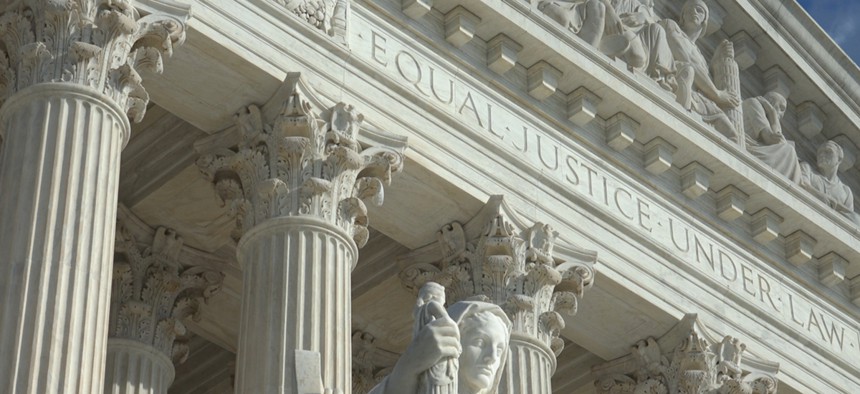U.S. Supreme Court Clears Way for Greater Online Sales Tax Collections by States

The U.S. Supreme Court Shutterstock

Connecting state and local government leaders
The 5-4 decision in the case South Dakota v. Wayfair overturns a 1992 case that said states could only require internet retailers to collect sales taxes if they had a physical presence in the state.
For more perspectives on Thursday's decision: State Sales Tax Collections Finally Move Into the Internet Age
States gained new power on Thursday to collect sales taxes from online vendors that are not located within their boundaries, as the U.S. Supreme Court sided with South Dakota over a group of retailers who challenged the constitutionality of a state law there.
In South Dakota v. Wayfair, Inc., the legal dispute centered on a law the South Dakota legislature passed in 2016 requiring out-of-state retailers that meet certain conditions to collect and pay sales taxes. The merchants that challenged the law, Wayfair, Inc, Overstock.com, Inc. and Newegg, Inc. have no employees or real estate in the state.
The 5-4 court decision has implications for state tax revenues, particularly in the long-term as online sales are expected to continue expanding in proportion to the overall retail market.
But some of the largest online vendors have already been paying sales taxes on many of their transactions, and e-commerce, while growing, still only made up about 9 percent of retail sales in the U.S. last year, so the near-term effects on state budgets could be more limited.
“It’s a pretty big deal," John Hicks, the executive director of the National Association of State Budget Officers, said by phone as he reacted to the Supreme Court's ruling.
“The amount of online sales is only going to grow," he added. "It stems the tide of sales tax losses.”
Hicks said that based on NASBO's figures for the last fiscal year, South Dakota, along with Florida, Tennessee, Texas and Washington all depend on sales taxes for more than half of their general fund revenues.
Justice Anthony Kennedy delivered the court’s opinion. It is a death knell for the so-called “physical presence rule,” which has blocked states from collecting taxes from out-of-state businesses. The rule was grounded in two prior Supreme Court cases that involved mail order catalog retailers—the 1992 Quill Corp. v. North Dakota case and the 1967 case National Bellas Hess, Inc. v. Department of Revenue of Illinois.
Thursday’s ruling from the high court called the physical presence rule established under Quill “unsound and incorrect” and said that the case, along with Bellas Hess, are overruled.
"The physical presence rule has long been criticized as giving out-of-state sellers an advantage," the court's majority opinion says. "Each year, it becomes further removed from economic reality and results in significant revenue losses to the States. These critiques underscore that the rule, both as first formulated and as applied today, is an incorrect interpretation of the Commerce Clause."
It goes on to say: "Quill creates rather than resolves market distortions. In effect, it is a judicially created tax shelter for businesses that limit their physical presence in a State but sell their goods and services to the State’s consumers, something that has become easier and more prevalent as technology has advanced."
"The Internet revolution has made Quill’s original error all the more egregious and harmful," the opinion adds.
Forty-one states and the District of Columbia had urged the court to reject the physical presence test cemented by Quill.
Kennedy was joined by Justices Clarence Thomas, Ruth Bader Ginsburg, Samuel Alito and Neil Gorsuch. Chief Justice John Roberts, along with Justices Stephen Breyer, Sonia Sotomayor and Elena Kagan, issued the dissenting opinion.
"We’ve waited 26 years," state Sen. Deb Peters, who authored the South Dakota’s tax legislation, and who is the current president of the National Conference of State Legislatures, said in a statement, referring to the end of the Quill standard.
"Good tax administration is good public policy," Peters added, "and state officials look forward to working with all stakeholders in the coming months as we move forward to level the playing field for all of our nation’s retailers."
The South Dakota law only requires out-of-state retailers to pay sales taxes if they have over $100,000 of sales, or 200 separate transactions, in the state annually. It is also written so that it can not be applied retroactively to past sales.
U.S. Government Accountability Office estimates released last year show that state and local governments could have gained $8 billion to $13 billion in 2017, if states could have required sales tax collections from all out-of-state “remote sellers,” like online vendors.
Those gains would be equal to about 2 percent to 4 percent of total 2016 state and local revenues.
ALSO on Route Fifty:
- A decision upholding South Dakota's law might not be an immediate revenue generator, but could be important in the long run, state officials said.
- More on the arguments in the Wayfair case can be found here.
Bill Lucia is a Senior Reporter for Government Executive's Route Fifty and is based in Washington, D.C.

NEXT STORY: State Budget Forecasts Could Shift in a Big Way





